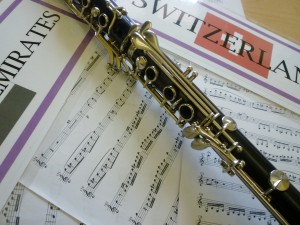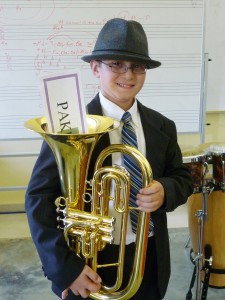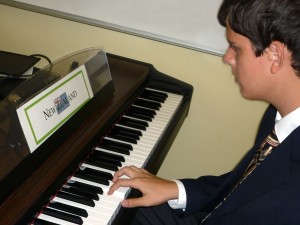
The first tentative steps I took along the path towards a Model UN career were paralleled by my introduction to the world of music as a twelve year old starting seventh grade. At the time, I could not have realized the relationship between the clarinet that was placed into my hands and the conferences that made me weak in the knees. Eventually, though, I would come to realize how both of these experiences were formative in shaping who I am and how they perfectly complement each other. Below you will find what I believe to be various components of musicianship—though not an exhaustive list, these factors are always present in any adept musician or Model UN delegate.
- Processing and Synthesis of Information: As long as you have been to at least one Model UN conference, it probably is clear to you that there is a lot to take in at once. While you are listening to another delegate’s speech, you may be simultaneously crafting a response to his or her points and at the same time be forming alliances through note passing. In fast-paced debate, you may have formulated the perfect remark to say in committee, but then another delegate will have made a game-changing speech and suddenly you are forced to change your focus. Developing the necessary skills to cope with these situations may be difficult, but I found the process smooth—something I attribute to my musical education. If you are playing in an ensemble or an orchestra, it is likely that you have to pay attention to a multitude of elements: your music, the conductor, your technique, and your fellow musicians. There are few examples of multitasking that compare. Thanks to my exposure to this type of stressful scenario, I have been able to apply the coping mechanisms I learned to other mentally taxing settings such as Model UN conferences.
- Ensemble skills: Literally meaning together in French, an ensemble of any kind is forced to listen to each other and strive towards achieving a common goal. I like to think of Model UN committees as such an ensemble. It is true that in many cases, delegates are competing against each other, as opposed, in theory, to members of a musical group. Nevertheless, if delegates don’t work together, their performance in committee is seen as lackluster. Whether it’s forming country blocs or passing working papers, it is necessary for delegates to work together. Before joining Model UN, you might have heard this spiel before in Kindergarten, but you are forced to really learn this social skill and put it to the test when playing in a musical ensemble. If the musicians don’t listen to each other, the piece might sound disharmonious or offbeat, just as a committee might appear off-kilter if delegates refuse to cooperate with each other. What about solos, you ask? Well, there are certainly soloists of incredible caliber in groups such as the London Symphony Orchestra and the New York Philharmonic. They did not receive their reputations, however, from these individuals. Each musician knows exactly how they are supposed to sound in conjunction with their fellow orchestra members. In Model UN, there are certainly power delegates who can hammer out extraordinary speeches and galvanize throngs of people to vote for their working papers. Notwithstanding their prowess, these people cannot simply snap their fingers and make things happen. It takes the right amount of persuasion and pressure, along with excellent social skills, to accomplish their goals.
- Technique: The power delegates I mentioned before don’t get to where they are by “winging it.” They follow a general formula that either they learned or developed themselves. When giving a speech, most power delegates know to keep their points clear but concise and look audience members in the eyes. They know that shoring up support for their working papers entails complimenting other delegates and offering them a warm smile. Musicians also know that there are certain formulas that they must follow. This varies by instrument, but everyone knows what works for them. Furthermore, excellent delegates will have dominated the rules of parliamentary procedure. Similarly, the best of the musically inclined will have mastered skills such reading music aural proficiency. I continue to learn music theory on a daily basis, which has motivated me to get my hands dirty with parliamentary procedure. Learning the fundamentals of anything can be a tedious process, but if it weren’t important, they would be considered fundamental.
- Creativity: Though it may seem that both music and Model UN are about following the rules, this is hardly the case. Both are at their best when we break (or at least bend them). I’m not saying delegates should abandon parliamentary procedure and that musicians should throw away what they learned in music theory. However, a certain amount of creativity is necessary to stand out. It is expected, almost as if it were written in stone, that there be deadlock in a committee about the Palestine-Israel conflict, that underdeveloped nations ask for aid as their “solution” to an issue, that “education” be trumpeted as the best solution to any social problem. Music taught me, however, to think outside the box. Just as there are many ways to interpret a piece of music, there are countless ways to combat an issue in Model UN. For more on this specific topic, I recommend you read this comparison between Model UN and jazz improvisation.
- Respect: This encompasses many aspects of both musicianship and Model UN. Of course, it is pivotal that you respect your fellow delegates and the chairs in any committee, just as it is important to respect your fellow musicians and the conductor. Always remember that the other delegates are not your enemies whose sworn mission is to one-up you. They are most likely there for the same reasons you are: to have fun and learn something. Tempers may run high among high school orchestras since its members are usually competing against each other for chair placement. Nevertheless, they recognize that if they don’t overcome these feelings, their playing as an ensemble will suffer. Above all, you have to respect what it is you are doing. If Model UN is nothing more than a line on a resume to you, don’t do it. I don’t play an instrument simply because it was handed to me in a music class years ago; I play an instrument because it means something to me. Every delegate should thus keep in mind why it is they are participating in this organization and make sure it is for the right reasons.




